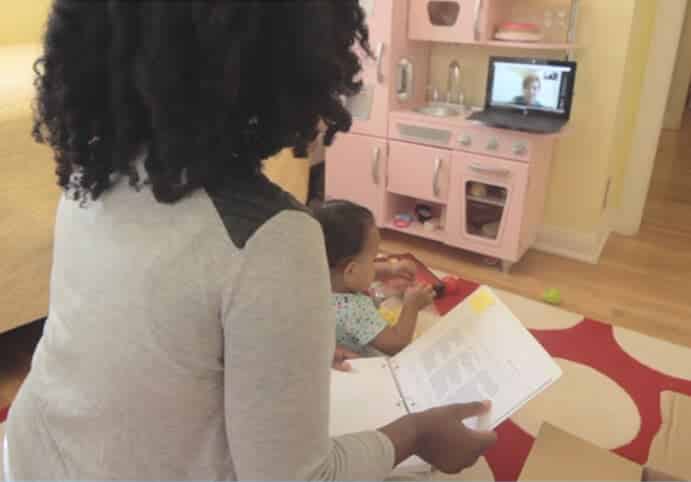Nonprofit organization leverages technology to support families
For three years, Parents as Teachers, has partnered with the University of Southern California’s (USC) Suzanne Dworak-Peck School of Social Work and Telehealth Clinic to establish the Parents as Teachers @ USC Telehealth project, an Interactive Video Conferencing (IVC) initiative that provides practical parenting support over the Internet.

A virtual home visiting session
The project delivers the Parents as Teachers home visiting model to families with children prenatal through age three entirely through videoconferencing technology. Headquartered in St. Louis, MO, Parents as Teachers is the nation’s most highly replicated early childhood evidence-based home-visiting model that uses a virtual method to deliver the four components of its model, which are visits, group connections, screening, and resourcing.
The Parents as Teachers @ USC Telehealth demonstration pilot involves collecting data on topics such as parental stress, maternal depression, child development, health and mental health, and family well-being. Parents as Teachers plans to launch virtual home visiting to hundreds of families within 10 sites and demonstrate its effectiveness through rigorous research.
“This virtual home visitation program was created as an important step to closing gaps in an industry that has relied on the same on-ground service and engagement strategies for the last 30 years,” said Angela Rau, Parents as Teachers’ virtual parenting education specialist. “We developed it based on families’ desires for technological solutions to meet their parenting needs, and barriers in the current home visitation industry.”
To date, the telehealth project has delivered 1,700 virtual visits, 50 group connections, and served 371 people with high levels of satisfaction. Ninety-one percent of parents participating in the project report feeling that the program increased their knowledge of child development and 91 percent were motivated to try new parenting strategies.
“This program complements our traditional approach of door-to-door home visits and allows families to receive individual home visits and or attend group meetings with other families to build social support from the comfort of their homes using their enabled tablets.”
Parents as Teachers uses multimedia and digital tools to engage parents and boost the health and development of children of low-income and first-time mothers by promoting the early cognitive and social skills in children, Rau said.
One fall afternoon, Mona, a single mom with limited resources, was surfing the Internet for agencies that could help her in raising her newborn child when she came across the Parents as Teachers telehealth project. Rau said Mona wanted an online parent support option because she felt so stressed as a new parent and the idea of someone coming into her home and seeing it messy caused even more anxiety.
“She was also experiencing chronic multiple sclerosis and was worried that her child was not meeting developmental milestones,” Rau said.
Through the Parents as Teachers virtual screening process, Mona’s home visitor detected a possible delay in her child’s development and referred her to a regional center for diagnostic testing. The center identified the child as being on the autism spectrum. Although Mona has moved several times, her home visitor continues to meet with her, building her competence and confidence in supporting her child’s development – thanks to the Parents as Teachers @ USC Telehealth project.
“The future of parenting support is to follow the social norms of the families in which we seek to provide service,” said Rau. “Contemporary parents, regardless of their financial status are by-and-large technologically and digitally competent. They rely heavily on their mobile communication devices to keep them engaged in everyday living.”
The Pew Research Center reports that 92 percent of adults who earn $30,000 or less own a mobile device, 64 percent of which are smartphones. In a world where 78 percent of people have access to a smartphone, Rau said utilizing a high-tech, high touch approach to meet with families using virtual strategies is the most innovative and effective method for reaching a mobile generation.
Virtual home visiting makes it possible to access and serve hard to reach communities like deployed military families, medically fragile children, and families who move a lot, Rau said.
“This project represents the attempt to provide live, interactive services in real time, largely thanks to the infrastructure provided by USC Telehealth, which has enabled clinicians and home visiting professionals to provide therapeutic support to clients,” said Rau. “Virtual home visitation will allow PAT to serve thousands of families, while other models are serving hundreds.”

